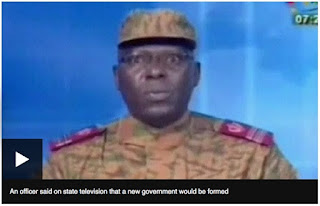Yesterday's coup in Burkina Faso was tragically predictable. What happens next?
(UPDATE: To be clear, I'm not claiming that I predicted with certainty this coup would happen, but I and others noted recently that the interim government was making decisions that increased the risk of a coup.)
In July, I noted some similarities between Burkina Faso and Egypt - an uprising against a president who had been in power since the 1980s, followed by talk of putting the former president on trial for treason. Now, another similarity has emerged; just as Egypt's transition to democratic rule was interrupted by a military coup, yesterday there was a military coup against the interim government, which was preparing for elections next month.
The coup d'etat should not be a surprise. In their preparations for next month's election, Burkina Faso was excluding the party of former president Compaore and his allies from participating in the election. Political elites don't like to be excluded from elections, and often respond violently. As I wrote in August,
One problem with the new (electoral) code was that it attempted to ban supporters of Compaore's attempted constitutional amendment to run for president. These types of exclusions can be problematic. For example, in Ghana the CPP banned opposition parties and then was overthrown in a coup by officers who in turn banned the CPP. Three years after the CPP-less election, another coup removed the government. A more recent example of party-exclusion followed by political instability is the the de-Baathification policyimplemented in Iraq after Saddam's overthrow in 2003.Burkina Faso, despite adopting the problematic electoral code, had an opportunity to avoid the risks of exclusion when the former ruling party (the CDP) and its allies appealed to the ECOWAS Court of Justice, who ruled that the ban was a violation of CDP supporters' human rights. The Constitutional Court of Burkina Faso ignored the ECOWAS Court's ruling, however, and banned legislative and presidential candidates from contesting next month's election. The CDP and its allies had no intention of taking this exclusion lying down, and called for their supporters to launch a campaign of civil disobedience.
It is little surprise that CDP allies in the military decided to launch a campaign of uncivil disobedience instead. In their statement justifying the coup, the military said their goal was peaceful and inclusive elections.
The dangers of Burkina Faso's exclusionary electoral policies were clear to many before the coup.
Back in June, International Crisis Group wrote that
The electoral code is a threat not only to the forthcoming elections but also to the future, by injecting the poison of political exclusion into a country that is attached to multiparty politics and dialogue. Potential appeals against the eligibility of candidates will be submitted from early September. The Constitutional Council could find itself submerged in petitions only one month before the election, which could delay voting. If the electoral calendar is not respected, Burkina will enter unchartered territory. Members of the transitional government, notably those drawn from the army, could argue that they should stay in power for the sake of stability.As it turned out, the Constitutional Court maintained the ban expediently enough to keep the calendar on schedule, and the m
ilitary acted against rather than for the transitional government. But the risk of a path from exclusion to military action has been visible since at least summer.
Pierre Englebert, professor of African Politics at Pomona College, agrees that 'The transitional government “overplayed its hand” by banning members of Mr. Compaoré’s administration from participating in the coming elections."'
Other factors that increased the risk of a coup:
- Coups are more likely in countries that have had coups in the past. Burkina Faso has had 5 successful coups since independence.
- A military with a history of coups often responds to civilian efforts to curtail the military by launching a coup. Two days after a commission recommended disbanding the presidential guard (RSP), the presidential guard responded with a coup. The military was also being investigated for its role in the 1987 assassination of the charismatic Thomas Sankara.
- Coups are more common in low income countries. Burkina Faso is among the poorest 20 countries in the world.
What will happen next?
It is unlikely that the military will remain in power for long. Recent coups in Mali and Guinea did not result in a long-term military government.
There will likely be a transition to civilian rule in the not-too-distant future, and elections. The CDP will not likely be excluded from those elections. In fact, parties who attempted to ban the CDP may be banned themselves (just as the Muslim Brotherhood was banned following Egypt's last coup).
Hopefully neither the military nor the CDP will overplay their hand, as the interim government did, and yesterdays events will eventually lead to democracy in Burkina Faso.
Perhaps the best we can hope for is that the military will negotiate some prerogatives and protections for itself (such as military control over the military budget and amnesty for the events of 1987 and this latest coup), and then inclusive elections. As Geddes, Frantz, and Wright note, "officers usually return to the barracks without being forced out, they tend to negotiate their extrication ... Usually military regimes extricate themselves from power by overseeing an election among civilian contenders."
UPDATE 2: More evidence that the coup was triggered by investigation into the military role in Sankara's death: the ballistic report was to be published today.
Interesting coincidence: ballistic results for #ThomasSankara death were supposed to be publish today #BurkinaFaso https://t.co/SPhnQ5Id9t
— Itay Ron (@itayron5) September 17, 2015



Comments
Post a Comment